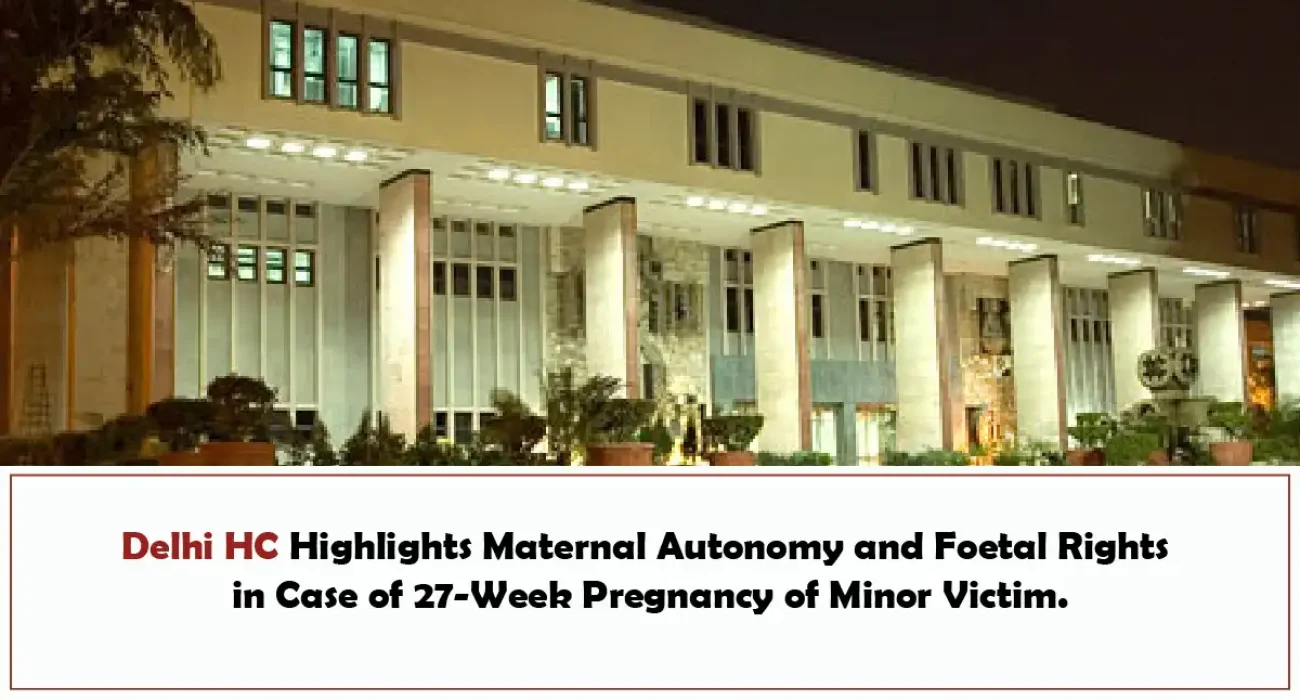

Table of Contents
ToggleThe case concerned a 15-year-old minor girl, who, through her mother, approached the Delhi High Court seeking permission for medical termination of her 27-week pregnancy. The pregnancy arose from a sexual assault perpetrated by a man known to the family, under the false pretext of marriage. The victim underwent multiple assaults between December 2024 and April 2025. Upon realizing she was pregnant in August 2025, she approached her parents, who lodged an FIR under Sections 69 of the Bharatiya Nyaya Sanhita, 2023, and Section 6 of the POCSO Act, 2012. Medical examination and ultrasound confirmed a 27-week gestation. The victim was also produced before the Child Welfare Committee for directions regarding medical termination. The statutory limit under the Medical Termination of Pregnancy Act, 1971 (MTP Act) is 24 weeks, which added a legal complication to the petition.
The petitioner argued that continuation of the pregnancy would inflict severe physical and mental trauma, violating her fundamental right to life under Article 21 of the Constitution, which includes the right to live with dignity and health. Her counsel emphasized that the pregnancy resulted from sexual assault, and the minor’s mental and physical well-being should take precedence over the foetus’s potential viability. Reliance was placed on the Medical Board’s recommendations and precedents allowing constitutional courts to exercise discretion in exceptional circumstances beyond the statutory 24-week limit.
The State opposed the petition, noting that the foetus, at 27 weeks, had a detectable heartbeat and could potentially survive if delivered. The State contended that statutory provisions of the MTP Act prescribe 24 weeks as the limit for termination, and any extension beyond this threshold requires careful judicial scrutiny. The State acknowledged the victim’s trauma but urged the Court to weigh the foetus’s potential survival.
Justice Arun Monga observed that the law must clearly balance maternal autonomy with foetal rights, particularly at the stage of viability. He stated, “The law must clearly delineate the balance between maternal autonomy and foetal rights at the stage of viability. No doubt, until such clarity is provided, courts will continue to tread this delicate path; but the ultimate responsibility to settle the matter rests with the law-making authority. It is time that the lawmakers of the country address this question in no uncertain terms.” The Court emphasized that a woman cannot be compelled to endure physical or mental trauma solely to preserve unborn life, noting that such compulsion would render fundamental rights nugatory.
Relying on the Medical Board’s report, the Court noted, “Considering the age of the petitioner and the mental and physical trauma inflicted upon her by the heinous act of sexual assault, this Court is of the opinion that continuation of the pregnancy would permanently scar her psyche and cause grave and irreparable harm to her physical and mental health.” The Court highlighted that, while the statutory limit is 24 weeks, constitutional courts may permit termination beyond this in compelling circumstances, particularly where continuation threatens the woman’s life, health, or dignity.
Justice Monga also addressed the broader legal question of foetal rights, observing that courts have permitted termination up to 28–32 weeks in cases of fatal foetal abnormalities, whereas terminations on non-medical grounds for viable and healthy foetuses have been declined. He concluded, “Judicial discretion, however sensitively exercised, cannot be a substitute for legislative determination. The law must clearly delineate the balance between maternal autonomy and foetal rights at the stage of viability.”
The Court allowed the petition, directing Dr. Baba Saheb Ambedkar Hospital, to carry out the termination at the earliest. It permitted the minor to be admitted immediately, clarified that doctors could withhold or cancel the procedure if her life was at serious risk, and instructed the hospital to preserve the foetus for DNA testing in connection with criminal proceedings. In case the foetus was born alive, the hospital was directed to provide all possible medical assistance, with the Child Welfare Committee ensuring appropriate legal steps. The Court noted that the costs of the procedure were to be borne by the State.
Written by Adv. Deeksha Rai
IAW resources
Browse our help directory